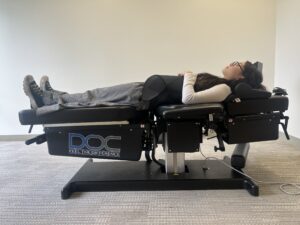It is estimated that 50 – 70% of the world’s population will experience neck pain at least once in their lives. Due to the modern way of life, the number of affected by this problem is increasing every day. In most cases it isn’t a serious condition, and can be relieved within days, but becomes chronic in about 10% of people. Stress, reduced daily physical activity, work in front of the computer, and improper sitting posture are just some of the reasons that can cause neck pain.
What Causes Neck Pain?
The list of reasons that can cause neck pain or stiffness is really long. Usually there is nothing to worry about, but rarely, it can be a symptom of more serious problem.
The most common cause of neck pain is muscle strain or ligament sprains. Other common causes include muscle spasms, osteoarthritis, cervical spondylosis, degenerative disc disease,
Less common causes that are serious and seek immediate medical care include a tear in the lining of the neck artery (dissection), meningitis, spinal tumor or infection, fibromyalgia, etc.
What Does Neck Pain Feel Like?
Neck pain or cervicalgia is manifested as a general discomfort in the neck area and stiffness in the neck muscles. The pain may radiate down to the shoulder, into the arm, the hand or up into the head, causing a headache.
The muscles in the neck usually are tensed, sore and feel hard to the touch. Acute pain can lead to abnormal neck posture in which the head is forced to be turned to one side, known as torticollis. When the pain is located at the base of the skull usually is accompanied by a prickly or tingling sensation in the arms and fingers and feeling of weakness in the shoulders and arms and difficulty lifting or gripping.
Depending of the reason for its occurring, neck pain may be accompanied by headaches, muscle pain, fever, stiff neck, throat pain, tenderness, loss of bowel or bladder control, etc.
In some cases, neck pain may be a symptom of more severe condition. If any of the following symptoms occur, seek medical attention urgently:
- A rash that doesn’t fade when you press it with a glass or a finger
- High fever
- Shortness of breath
- Sensitivity to light
- Severe headache
- Vomiting uncontrollably
- Severe back pain
- Painful bending forward and the patient can’t put their chin on their chest
- If following a head injury the person is drowsy, confused or is vomiting
- Pain behind one eye
- vision, hearing, taste or balance are affected
Learn more with these helpful resources:
How Is Neck Pain Diagnosed?
The most important part of diagnosing the cause of neck pain, is the history of the symptoms. The doctor will ask questions about localization, intensity, duration and radiation of the pain, and will note any past injuries.
The physical examination includes examination of the neck at rest and in motion. Moving the neck in different directions is performed to check the range of motion and its soreness.
Usually, no tests are needed. But in certain cases, the doctor may order X-ray, CT scan, MRI, EMG or nerve conduction studies.

How Do I Solve Neck Pain?
Your doctor can prescribe you painkillers, muscle relaxants or tricyclic depressants for pain relief. Other possible options include:
Physical therapy – it will teach you the correct posture and alignment and neck-strengthening exercises. And can use heat, ice, electrical stimulation and other measures to help ease the pain.
Transcutaneous electrical nerve stimulation (TENS) – It involves placing electrodes on the skin near the painful areas and delivering tiny electrical impulses that may relieve pain.
Traction- This therapy may provide relief of neck pain related to nerve root irritation.
Short-term immobilization – Using soft collar that supports the neck may help relieve pain by taking pressure off the structures in the neck. But it is important to note that if used for more than three hours at a time or for more than one to two weeks, a collar might do more harm than good.
Steroid injections – inject corticosteroid medications into the structures of the neck to help with pain.
Other non-convention treatment options include:
Over-the-counter painkillers – such as acetaminophen, ibuprofen and naproxen. These can help coping with mild pain.
Applying hot or cold pads – will help reduce the inflammation and pain.
Home exercises –
Acupuncture – Acupuncture care is
Chiropractic – Chiropractic treatments to the neck can provide short-term pain relief for many people, and eventually solving the underlying problem. To get to the root cause of pain and discomfort, schedule an initial consultation, including a comprehensive evaluation and first treatment.
Massage –Massage therapy may provide relief when combined with your doctor’s recommended treatments.
Prevention Is Better Than A Cure
In most cases, neck pain is
- Use good posture.
- Take frequent breaks while traveling long distances or working long hours
- Adjust your desk, chair and computer so that the monitor is at eye level.
- Avoid tucking the phone between your ear and shoulder when you talk.
- If you smoke, quit. .
- Avoid carrying heavy shoulder bags or purses.
- Sleep in a good position, on your back or side with your head supported, but not raised
- Exercise, including muscle-strengthening and stretching exercises
- Keep your back straight when standing and sitting
- Don’t stand or sit for long periods
If you are looking for neck pain relief and would like to find out if you are a candidate for our treatment we would like to meet you. To get to the root cause of pain and discomfort, schedule an initial consultation, including a comprehensive evaluation and first treatment.




